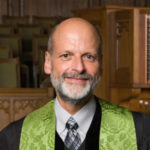 Good morning!
Good morning!
I hope this day finds you and your family well. I invite you to take a few moments with me to read and reflect upon today’s scripture selection — and to carry these thoughts with you into your day.
Today’s Scripture: 1 Thessalonians 5:12-21 New Revised Standard Version (NRSV)
12 But we appeal to you, brothers and sisters,[a] to respect those who labor among you, and have charge of you in the Lord and admonish you; 13 esteem them very highly in love because of their work. Be at peace among yourselves. 14 And we urge you, beloved,[b] to admonish the idlers, encourage the fainthearted, help the weak, be patient with all of them. 15 See that none of you repays evil for evil, but always seek to do good to one another and to all. 16 Rejoice always, 17 pray without ceasing, 18 give thanks in all circumstances; for this is the will of God in Christ Jesus for you. 19 Do not quench the Spirit. 20 Do not despise the words of prophets,[c] 21 but test everything; hold fast to what is good;
Tim’s Devotional Reflection for Today
Paul wrote in his earliest letter to the Thessalonians, “Rejoice always. Pray continually. Give thanks in every situation because this is God’s will for you in Christ Jesus.”
Through the centuries, some people have been extreme in trying to live this out literally. Early on, some Christians sought solitude and silence in the desert to achieve it. They went off by themselves and lived as hermits devoted to praying constantly. Some even went without sleep — or at least claimed to do so — so they could pray continually. They went by the name of Akoimitai, which means “nonsleepers.”
But what do Paul’s words really mean for us? It surely isn’t an activity to be engaged in 24/7. Rather, it’s an attitude and orientation toward life and an awareness and attentiveness to the presence of God.
In Paul’s letter to the Philippians, he must have raised the same kinds of questions when he said that we should “rejoice always” and “give thanks in all circumstances.” Really? ALWAYS? In ALL circumstances?
Paul has four exhortations that we can apply to our own lives:
- “Rejoice always” (v. 16) — When we’re in a positive state of mind internally, it’s a lot harder to be negative toward others.
- “Pray without ceasing” (v. 17) — Prayer moves us toward the mind-set of God. When we see every aspect of our lives as belonging to God, we begin to see others as children of God, too. Constant communion with God keeps our focus outside of ourselves so that we can begin to engage others with the kind of grace and love that Jesus lived and taught.
- “Give thanks in all circumstances” (v. 18) — An “attitude of gratitude” is contagious. Paul didn’t say that we should give thanks FOR all circumstances. Rather, he said IN all circumstances. Thankful, positive people see opportunities where others see problems. Thankfulness enables us to see the gifts that are present even in the most difficult times—such as the pandemic.
- “Don’t quench the Spirit” (v. 19) — The Spirit “moves in mysterious ways,” which is to say that often we’re not aware of how God is moving in a particular situation. When faced with a circumstance, one of the best ways to react is by asking how God is working in this situation.
I think we have so often thought of prayer as an activity in which we mostly ask for something from God, that it may be hard for us to think of prayer as a constant attitude – an orientation to God and awareness of the presence of God.
I have a little book in my library that was helpful for me in making a shift in my thinking. The book is entitled The Practice of the Presence of God. It is a book put together in memory of a seventeenth-century Carmelite lay brother named Nicholas Hermann, or Brother Lawrence. He entered the monastery at mid-life. For ten years he tried Carmelite methods of prayer, but they only frustrated him.
As one who has a hard time sitting still in a quiet room and praying for any length of time, I identified with Brother Lawrence. He found his own way in his service as the monastery’s cook. Washing dishes one day in the kitchen, he discovered that he could talk God and as he went about his work, he could “practice the presence of God.”
For Brother Lawrence prayer was, above all, attentiveness. “My commonest attitude,” he wrote, “is this simple attentiveness, a habitual, loving turning of my eyes to God.”
As you think about Paul’s words in 1 Thessalonians, I invite you consider some questions: What is your prayer life like? When and how do you most often pray? What do you find most difficult about praying? What would it mean for you to “pray continually” or to make all of life a prayer?
Thank you for sharing this early moment of your day with me, with God, and with the words and reflections I hope you will carry with you throughout the coming day and night.
Grace and Peace,
![]()
Dr. Tim Bruster
Senior Pastor

